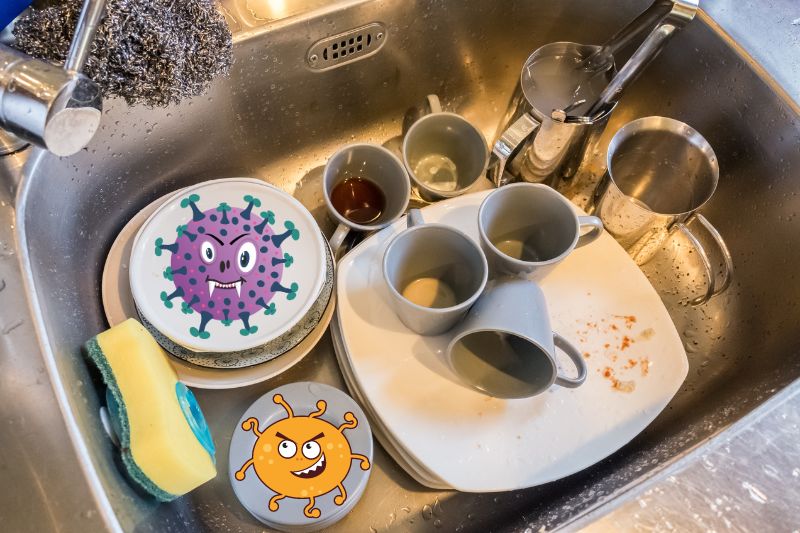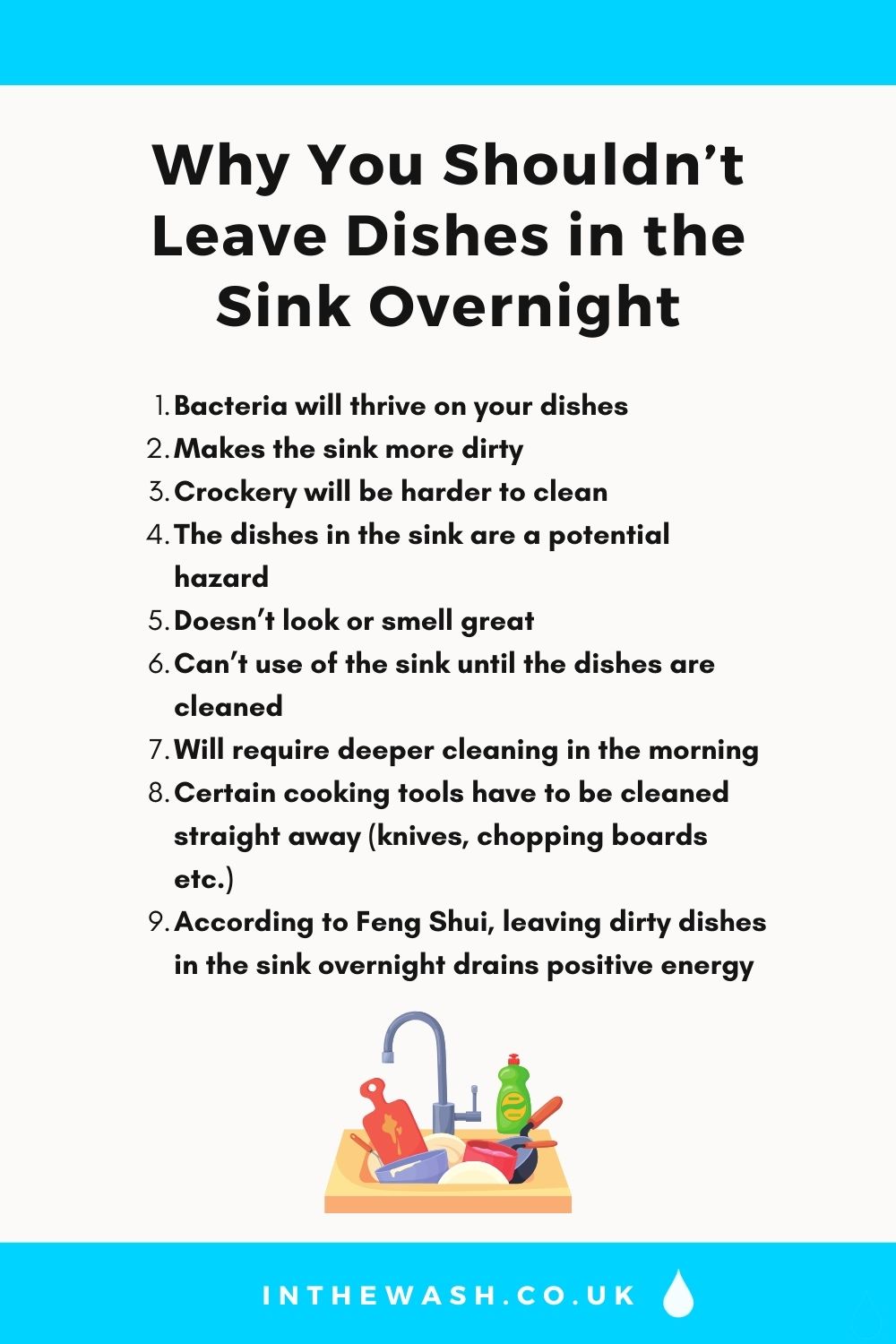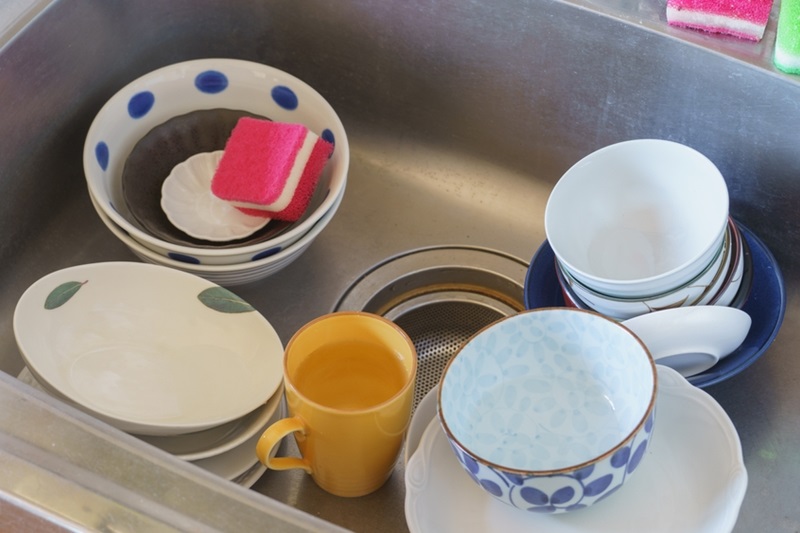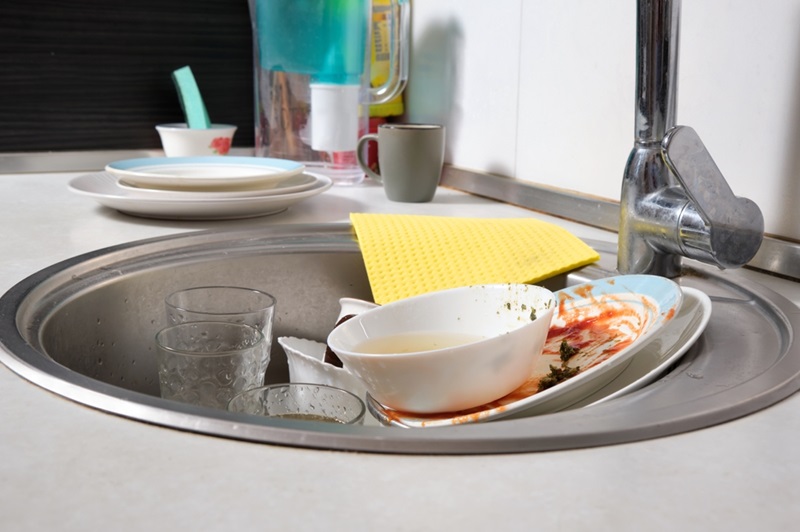Doing the dishes is the type of task we like to put off so that we can do something more interesting!
Catching up with friends and family, binge-watching the latest series on Netflix, or gaming. Whatever it is, it’s bound to be way better than washing pots and pans!
However, being sensible, most of us will decide to meet somewhere in the middle. So, we’ll soak the dishes in the sink with a view to cleaning the crockery afterwards.
Except ‘afterwards’ never materialises. So, the bowls, plates, you name it, are left in the sink until the following day.
But is it actually a good idea to leave dishes in the sink overnight? Or would it be better to clean the plates and cutlery immediately so the task is done and out of the way?
In short, if you leave your dishes in the sink overnight, the crockery cops aren’t going to come after you and fine you for not washing up.
However, leaving the dishes in the sink for a long time isn’t great because you’ll have a mountain of dishes to clean the next morning, and bacteria will flourish in the area.
It would be better to clean your dishes straightaway rather than allowing them to sit in a sink filled with grotty water overnight.
Let’s look at this in more detail.
Why You Shouldn’t Leave Dishes in the Sink Overnight
1. Bacteria will thrive

If you leave your dirty dishes in the sink overnight, bacteria will grow and multiply quickly in the area.
Essentially, you’ll have supplied the bacteria with the perfect homely environment, which in turn, will become a breeding ground – a moisture-filled region with access to nutrient-rich food with minimal airflow.
The dishes in the sink will be coated in leftovers, grease and vital nutrients that bacteria will feast upon!
Given that the water in the sink won’t be hot enough to kill the germs, they’ll continue to grow rapidly when they’re just left to their own devices!
Consequently, the dishes in the sink will just get dirtier as time goes by.
In addition, there’s a chance that the bacteria-riddled water could be touched by people/animals in the house.
For example, big dogs like to lick the water in the sink. If they drink the water, they could become seriously unwell.
2. The sink is already a breeding ground for bacteria – don’t make stuff worse!
As a direct follow-on from the point above, the sink, regardless of whether it is filled with dishes or not, is the ideal place for bacteria to grow!
Sinks and drains are regularly filled with food-related gunk and liquids, and it’s a generally toasty environment. E. coli, for example, will thrive in such a place. And even when a sink is cleaned, it’ll still be a home for germs!
So, whether you realise it or not, by putting your dirty dishes in the sink overnight, you’re just speeding up the growth of bacteria!
The germs don’t need much encouragement to grow anyway, so by placing crockery in the area, you’re giving them even more of what they need to mature and expand.
3. Crockery will be harder to clean
Aside from the bacteria, you’ll have to deal with the hardened grime that’s on your plates and pans.
The dirt, which could have been rinsed off the night before, will be more challenging to remove the next day because it’ll have dried out and gone tough!
Consequently, you’ll have to soak the dishes to clean them effectively, which takes more time. And you’ll have to put in some elbow grease to get the grime off the surfaces!
Imagine having to clean burnt pans and grease-laden tins in the morning. Yucky!
4. The dishes in the sink are a potential hazard
If you load your sink up the night before you do your dishes, you’ll have forgotten what’s in the sink the next day. So, when you go to clean the dishes, you’ll be sticking your hand into grubby water that’s full of hazardous objects!
For example, you may catch your hand on a sharp object, like a knife, when you submerge your hands in the water.
Similarly, a glass/plate may have broken under impact during the night, and you’re completely unaware of it. Consequently, you could end up hurting yourself.
In addition, if you’ve stacked the dishes up high in the sink. They may topple over and could fall over/onto someone during the night.
By doing your dishes straight away, you can limit problems like those listed above. Although, you should always be careful when handwashing dishes!
5. A cluttered sink doesn’t look or smell great
Do you want to be greeted by a mountain of dishes in the morning? No, I didn’t think so. It’s very off-putting.
A pile of crockery in the sink looks cluttered and messy, and you know that it’s going to take you a while to clean the toughened dirt off the stuff, which doesn’t help matters if you’re in a rush to be somewhere. It doesn’t exactly set you up for the day ahead!
In addition, the overfilled sink area may be smelly, and you’ll likely have a disgusting, dirty water line going around the top of the sink where all the grime and grease have gathered overnight. Plunging your hands into this filth first thing in the morning is a bit yucky.
In this type of situation, you’re more likely to think, ‘I’ll leave this’ and walk away! Of course, this makes the issue worse.
This is why it’s a good idea to keep on top of the daily dishwashing, so it doesn’t mount up too much.
Note: Remember that cluttered spaces can lead to heightened stress and anxiety. And it can be difficult to focus and stay motivated in such environments. Try and stay on top of the dishwashing to alleviate some of these feelings.
6. You will lose the use of the sink
A sink filled with dishes takes up room. And if the crockery is stacked up too high, you will not be able to use the taps.
This isn’t practical because you, your family members, or your flatmates may need to use the facility at night, but they won’t be able to. It’s also disrespectful to others if you leave your stuff in the sink, and it can create needless friction between you all.
7. Your dishes will be contaminated and will require deeper cleaning
As mentioned above, bacteria will thrive in the sink area, particularly if the site is filled with dirty dishes overnight.
This means that you have to make sure that you clean your crockery thoroughly when you do get around to cleaning them because they’ll be teeming with germs.
You must make sure the crockery is cleaned effectively before it is used again. You don’t want to put food on contaminated plates!
8. Certain cooking tools have to be cleaned straight away
It’s also worth noting that there are some cooking tools that you have to clean immediately.
Implements like knives, chopping boards, and worktop protectors that have come into contact with raw meat, for example, must be washed immediately. They should not be left in a sink overnight.
9. Superstitions come into play
If you believe in superstitions, this one will apply to you.
According to Feng Shui, leaving dirty dishes in the sink overnight drains positive energy. So, if you’re a believer, get on with cleaning those dishes, and positive vibes will come your way!

How to Motivate Yourself to Get the Dishes Done
A lot of us find it easier to put off doing the dishes and procrastinate instead. It’s not a big deal because we eventually get on with task.
But if you’re having trouble motivating yourself, check out the points below and utilise some of them:
- Consider the points mentioned above. Then, ask yourself if you want to subject yourself and your dishes to the issues mentioned. (Of course, there will be a time(s) when leaving the dishes is justified!)
- Give yourself little rewards for doing the dishes. For example, tell yourself, “When the dishes are done, I can go and watch an episode of The Wheel of Time.”
- Get the family involved in the task. Doing the dishes is something that the whole family can get involved with! One night, someone can wash while the other dries. And vice versa!
- Do a pros and cons list. Consider the main benefits and drawbacks of doing and not doing the cleaning. A short list like this can bring the important things into focus.
- Consider the needs of others. For example, if you live in shared accommodation and share the utilities, it’s not fair to leave your dishes in the sink overnight. Similarly, if you leave too many pots and pans in the sink, people may not be able to access the tap to get water. This can create friction between housemates.
- Try and make a habit of doing the dishes each day so you get in the ‘zone’ of doing them. For example, pick a time and do the dishes at the same time each day.
- Make your job easier and clean as you go. So, by the time you’ve finished eating your meal, you’ll have half (maybe even less) crockery to wash. Consequently, you’ll be able to wash the dishes quickly.
- Put a podcast or some music on to keep you in the cleaning mood when washing dishes!
- Grab the right washing tools. The right cleaning equipment usually makes the job easier.
- Think about alternative ways of doing the dishes if hand washing them in the sink isn’t suitable. Consider getting a dishwasher.

What Happens If You Leave Dishes in the Sink for too Long?
If you don’t bother cleaning your dishes, they’ll eventually be overrun with bacteria and become completely unsanitary. Consequently, you won’t be able to use any of the crockery until you’ve cleaned them properly.
All of the points mentioned above will also come into play. As a result, you may not have any dishes to eat from if they’re piled up in the sink, your worktops will be cluttered, unusable and contaminated, and there’ll be a foul smell in the area
In addition, if you leave dirty crockery around, the leftover food will eventually attract the attention of insects and vermin (in the worst case). If such an infestation occurs, you’ll have to call a pest control expert to manage the problem.
Finally, you could be seriously unwell if you accidentally eat from the germ-filled surfaces mentioned. In this case, you may have to seek medical attention.
Of course, this really is a worst-case scenario type of situation – you’d have to leave the dishes for a considerable amount of time for this to happen!

Bethan has a passion for exploring, reading, cooking and gardening! When she’s not creating culinary delights for her family, she’s concocting potions to keep her house clean!






